On the second morning of O-Week, Rice’s incoming Class of 2023 gathered in Tudor Fieldhouse to hear a panel of professors share their secrets for success — both at Rice and beyond. Three faculty members from three schools delivered short, TED-style talks designed to encourage freshmen to remain open to the possibilities Rice offers.
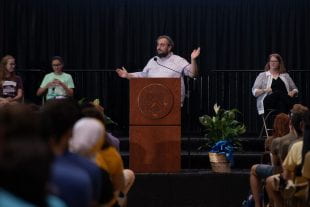
“Knowledge changes you and it changes how you see the world,” said assistant professor Simon Fischer-Baum. (Photo by Jeff Fitlow)
“The Rice learning experience is something that is very ongoing in terms of what it is you will choose to focus on during your academic career,” Dean of Undergraduates Bridget Gorman said as she opened the Aug. 19 event.
Asking the freshmen to lift their hands if they’re pre-med students, Gorman noted the response. Every year, she said, 4 out of 10 Rice students indicate an initial interest in pre-med work, but there are many other ways to craft a health-related career than going to med school.
Gorman shared her own professional journey as an example: She’s a sociologist and demographer who studies health disparities, which was a career path she never envisioned as a freshman.
“I blame it all on sociology class I took somewhat randomly during my sophomore year of college,” Gorman said. “The path ahead is truly unpredictable.”
McMurtry College senior Olivia Morris introduced the first faculty speaker, Simon Fischer-Baum, an assistant professor in the Department of Psychological Sciences who studies how human minds understand language.
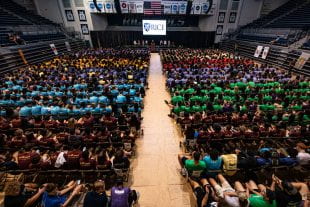
Rice’s nearly 1,000 new freshmen gathered in Tudor Fieldhouse Aug. 19 for the traditional faculty address. (Photo by Jeff Fitlow)
Or, as Fischer-Baum put it, he studies “language as it’s processed through the diversity of human experience.”
Using the examples of synaesthesia, amusia and prosopagnosia — neurological conditions in which people process colors, music and human faces in vastly different ways from the median population — Fischer-Baum emphasized that just because you don’t hear music as “the banging of pots and pans” or “see” the number 9 as green doesn’t mean your experience with music or color is the one true and valid position.
“We assume that the world we see is the world everyone else sees,” Fischer-Baum said. But in reality, “others are experiencing a world different from your own.”
On the monitors above the Tudor Fieldhouse floor, Fischer-Baum showed an image of the famous “dress” phenomenon that revealed differences in human color perception when it went viral on the internet in 2015. Was the dress blue and black, or white and gold?
What really matters, Fischer-Baum said, is how you learn from such a discussion by acknowledging that variation exists, trusting your own experiences while also believing others and being open to seeing how your understanding of the world changes a little bit with each new piece of knowledge you accumulate.
“Knowledge changes you and it changes how you see the world,” he said.
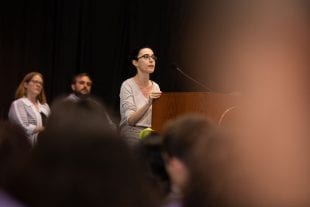
Assistant professor Esther Fernández related her own struggles coming on board as a new professor at Rice in 2015. (Photo by Jeff Fitlow)
Martel College senior Elizabeth Jowers introduced the second speaker, Esther Fernández, assistant professor of Spanish peninsular literature and culture in the Department of Spanish, Portuguese and Latin American Studies.
Fernández told the students she originally thought she might tell them about her research or about the value the humanities bring not only to an education, but also to life. Instead, she opted to relate her own struggles coming on board as a new professor at Rice in 2015.
Rice, Fernández said, had been a dream ever since a friend and fellow professor first told her about his alma mater in Texas while the two were working at the University of Iowa. They talked about Rice a lot during the cold, Midwestern months, Fernandez said.
“In my mind, it was an idyllic intellectual refuge where winters did not exist,” she said. But the reality of finally getting her dream job here four years ago was equal parts exciting and terrifying.
“I struggled to adjust to new expectations and fully experienced that impostor syndrome you’ll be hearing all about this week,” Fernandez said. She soon realized, however, that Rice offered her “the resources and the mental space I needed to fully concentrate on my research.”
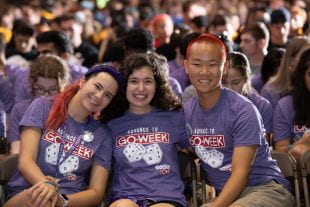
McMurtry College students sported their O-Week shirts alongside their new classmates. (Photo by Jeff Fitlow)
Today, she said, thanks in large part to her supportive colleagues and “diligent, brilliant and caring students,” teaching at Rice “became something I had always hoped for.”
Her advice to students struggling to adapt to their new lives was to remember that peoples’ journeys aren’t so different at the end of the day.
“Rice has been a challenge for me as it will no doubt be for you, but it’s a place that can take you very far if you’re passionate about what you do, if you lean in, you learn how to ask for help and never put (up) intellectual barriers for yourself,” Fernandez said. “Follow your questions wherever they take you.”
Will Rice sophomore Lauren Ross presented the day’s final speaker, Ivo-Jan van der Werff, professor of viola in the Shepherd School of Music. The professor introduced himself by playing four very familiar pieces of music, including snippets from The Verve’s hit song “Bitter Sweet Symphony” and “Hedwig’s Theme” by John Williams, better known as the leitmotif for the Harry Potter series of films.
What did all of these pieces have in common? Van der Werff and his viola, which he’s played as part of the Medici String Quartet for 28 years, can be heard in all of them.
“At your age I was starting at the Royal College of Music in London,” said van der Werff, who had agonized over the decision he’d made to pursue music performance over astrophysics.
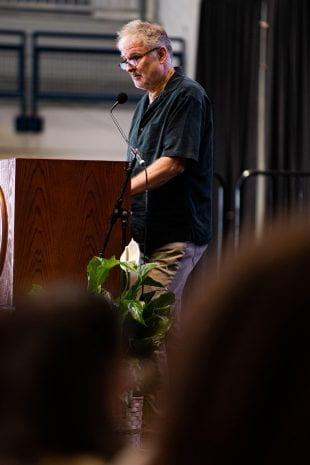
“I had no idea I’d end up teaching or performing on thousands of film scores,” said Ivo-Jan van der Werff, professor of viola. (Photo by Jeff Fitlow)
“I had no idea I’d end up teaching or performing on thousands of film scores,” he said. “I’m not telling you this to show off — OK, maybe a little bit — but because you are at one of the most exciting times in your life so far.”
Reaching that point, however, took more than pure talent. Van der Werff first found he had to study harder than ever in college just to keep “within touching distance” of other students around him.
“There always seem to be more talented people around, as you will definitely discover at Rice,” van der Werff said. But rather than focus on them, he said, “focus on yourself and what you need in order or fulfill your own unique goals, because talent or skill is only part of what we need to succeed.”
Van der Werff closed by encouraging everyone in the audience to attend at least one concert or recital at the Shepherd School: “They’re free, so you have no excuse!” he said with a laugh.
“We can all get immersed in our subjects, but I hope all of you take the time to admire others’ skills and what’s different about each other,” van der Werff said.
“Be open to your fellow students’ ideas and backgrounds and be willing to share your own thoughts in conversations,” he said. “What you do now will prepare you for an exciting and hopefully unexpected future.”

